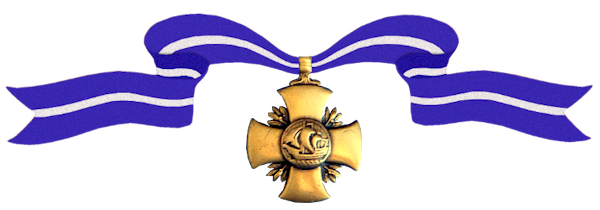Edward O’Hare grew up in Chicago, where his father was murdered by Al Capone’s gang. He graduated from the U.S. Naval Academy at Annapolis, Class of 1937. He became a World War II Navy ACE, credited with shooting down seven enemy aircraft in aerial combat. He was lost in action in a night mission after his Medal of Honor mission, when he was mistaken by the rear gunner of another Navy TBF, and shot down. The International Airport in Chicago is named for him.

–
Cemetery:
Awards Received
-

Medal of Honor
-

Navy Cross
-
Medal of Honor
Service:
United States NavyRank:
LieutenantBatallion:
Fighting Squadron 3 (VF-3)Division:
U.S.S. Lexington (CV-2)Action Date:
February 20, 1942
The President of the United States of America, in the name of Congress, takes pleasure in presenting the Medal of Honor to Lieutenant Edward Henry “Butch” O’Hare (NSN: 0-78672), United States Navy, for conspicuous gallantry and intrepidity in aerial combat, at grave risk of his life above and beyond the call of duty, as section leader and pilot of Fighting Squadron Three (VF-3), attached to the U.S.S. LEXINGTON, on 20 February 1942. Having lost the assistance of his teammates, Lieutenant O’Hare interposed his plane between his ship and an advancing enemy formation of nine attacking twin-engine heavy bombers. Without hesitation, alone and unaided, he repeatedly attacked this enemy formation, at close range in the face of intense combined machinegun and cannon fire. Despite this concentrated opposition, Lieutenant O’Hare, by his gallant and courageous action, his extremely skillful marksmanship in making the most of every shot of his limited amount of ammunition, shot down five enemy bombers and severely damaged a sixth before they reached the bomb release point. As a result of his gallant action–one of the most daring, if not the most daring, single action in the history of combat aviation–he undoubtedly saved his carrier from serious damage.
-
Navy Cross
Service:
United States NavyRank:
Lieutenant CommanderRegiment:
Air Group 6 (AG-6)Division:
U.S.S. Enterprise (CV-6)Action Date:
November 26, 1943
Bureau of Naval Personnel Information Bulletin No. 329 (August 1944)The President of the United States of America takes pride in presenting the Navy Cross (Posthumously) to Lieutenant Commander Edward Henry “Butch” O’Hare (NSN: 0-78672), United States Navy, for extraordinary heroism in operations against the enemy while serving as Pilot of a carrier-based Navy Night Fighter Plane in Air Group SIX (AG-6), attached to the U.S.S. ENTERPRISE (CV-6), and deployed over Tarawa in the Gilbert Islands. Lieutenant Commander O’Hare personally organized and voluntarily led the first night fighter section of aircraft to operate from a carrier, at night, against enemy aircraft, although he well knew the hazard involved. On the night of 26 November 1943, when the Task Group containing his parent vessel was under threat of imminent attack by Japanese aircraft, off Tarawa, Gilbert Islands, he took off with his night fighter section, which with unswerving devotion to duty and extraordinary skill, intercepted the largest group of enemy aircraft, thereby effectively breaking up that phase of the attack and destroying two Japanese planes. His capable and determined leadership and his extraordinary heroism, which was beyond the call of duty, were responsible in large measure for saving an important Task Group from serious damaged. From this action Lieutenant Commander O’Hare failed to return.


